

THE ANALECTS
Note: Best viewed and printed in Internet Explorer.


These are the five cardinal Confucian virtues. See web resources and commentary below for an explanation of each.
![]() the junzi (chün-tzu) is
Confucius' ideal person. Literal meaning is "son of the ruler," prince, but
contemporary translations are superior person or authentic person. Except for implications
in some elitist passages, Confucius appears to grant the potential for anyone to become a junzi.
the junzi (chün-tzu) is
Confucius' ideal person. Literal meaning is "son of the ruler," prince, but
contemporary translations are superior person or authentic person. Except for implications
in some elitist passages, Confucius appears to grant the potential for anyone to become a junzi.
1:1 The fusion of the theory and practice; also the fusion of rhetoric and logic.
![]() 1:4 shu—-reciprocity,
loyalty, deference, altruistic, doing your best and respecting others (Lau). Shu is other
regarding.
1:4 shu—-reciprocity,
loyalty, deference, altruistic, doing your best and respecting others (Lau). Shu is other
regarding.
 zhong (chung)—-faithful,
conscientious, trustworthy, self respect. zhong is self-regarding. These two are "one
thread" of Confucian thought and the primary expression of ren*.
zhong (chung)—-faithful,
conscientious, trustworthy, self respect. zhong is self-regarding. These two are "one
thread" of Confucian thought and the primary expression of ren*.
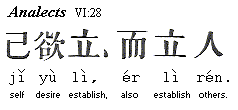 Self-constitution is
interrelated to other-constitution. Our own personal identity is just as much created by
others as it is created by ourselves. This the basis for the comprehensive virtue of
ren *.
Self-constitution is
interrelated to other-constitution. Our own personal identity is just as much created by
others as it is created by ourselves. This the basis for the comprehensive virtue of
ren *.
![]() The virtue
of xin*. The literal meaning: a person standing by [her] word. Serving
parents and ruler and making "good on their word" (xin*). Even though unschooled, they are still learned and education (hsueh/xue) Even though
unschooled, they are still learned and educated (hsüeh/xue). (1:7, A&R) “Xin* is the
consummation of fiduciary relationships” (A&R, 53). There is another Chinese
character transliterated as xin (heart-mind), so xin* will indicate this
meaning of honesty, integrity, and sincerity.
The virtue
of xin*. The literal meaning: a person standing by [her] word. Serving
parents and ruler and making "good on their word" (xin*). Even though unschooled, they are still learned and education (hsueh/xue) Even though
unschooled, they are still learned and educated (hsüeh/xue). (1:7, A&R) “Xin* is the
consummation of fiduciary relationships” (A&R, 53). There is another Chinese
character transliterated as xin (heart-mind), so xin* will indicate this
meaning of honesty, integrity, and sincerity.
1:8 shu and zhong are fundamental. The moral meaning is that self-respect and respect of others go hand in hand.
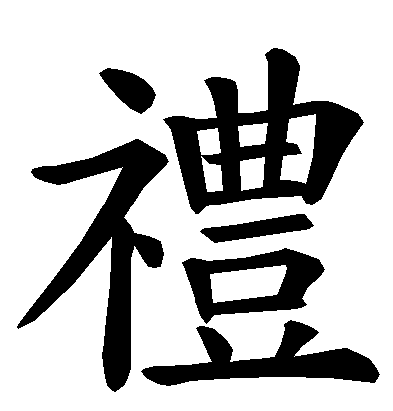 1:12 li brings harmony and besides it is
beautiful (Lau) or excellent (Chan). The unity of fact, value, and the aesthetic; the
unity of truth, goodness, and beauty.
1:12 li brings harmony and besides it is
beautiful (Lau) or excellent (Chan). The unity of fact, value, and the aesthetic; the
unity of truth, goodness, and beauty.
1:15 virtue ethics as an art form. One image of
self-cultivation in early Chinese thought is the carving of a raw stone. At birth we are
like uncut gems, and we have an obligation to shape and polish our potential in the most
unique and beautiful ways possible. The Book of Songs proclaims: "Elegant is
the junzi; he is as if cut, as if filed; as if chiseled, as if polished; how
freshly bright; how refined. . . ." Joining Buddha and Plato, we can definte
Confucian virtue ethics as "the art of making the soul balanced and harmonious,"
with art meaning the creation of a rare and distinctive person of virtue. A more specific
definition of Confucian virtue ethics would be the art of making ren ren*, where
the first ren is a mere person who makes herself into truly humane (ren*).
The second character is the first character with the number two added, so the literal meaning is "Two-peopleness." Therefore, being truly humane is to be always and already in relationship with people.
Mencius 7b16: "Benevolence (ren*) is being human (ren). To bring them into harmony and put it into words is the Way" (van Norden trans.).
(1:7: A person is better if she places character before beauty? Leys: “good looks”; Huang: “beautiful women.” Does not this separate beauty from goodness just as does European philosophy? David Hinton saves the aesthetics of virtue: "Cherishing wisdom as if it were a beautiful woman.")
Virtue ethics is contrasted with rule-based or duty-based ethics, where the moral person conforms to universal moral laws or does her duty. One of the principal differences between the two types of ethics is the idea of self-discovery. In a rule-based ethics all that one learns that usually one does not always conform to the rule. The only aspect of self-discovery is a negative one: you always fall short. In the virtue ethics of Confucius or Aristotle a virtue is always a person mean between extremes and finding that mean and fine-tuning is a great adventure of self-discovery. Read Gier's article on this topic.
2:3 Please note the difference here between leading the people through law and order (rule based ethics and leading them by virtue.
2:12 The junzi is not an implement (utensil in other trans.) In other words, he is not a specialist or a bureaucrat. The superior person is trained in the liberal arts not any particular specialty.
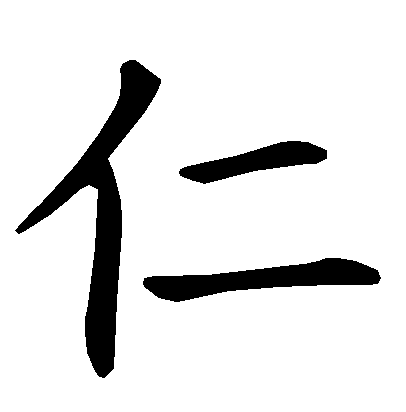 4:4 Set your mind on ren* and you'll be free
from evil (i.e., harmonious and content).
4:4 Set your mind on ren* and you'll be free
from evil (i.e., harmonious and content).
4:15 A single thread in my thought: conscientiousness (zhong), which can be see as establishing one's own character, which is always paired with shu (reciprocity, altruism) in which you respect the character of others.
![]()
![]() 4: 16 The first two character make up the word junzi
and the second set is the word for petty person. "The junzi
understands what is appropriate (yi); petty persons understand what is of
personal advantage (li). This is yet another li, which we will
indicate as li* and the neo-Confucian cosmic principle as li**.
4: 16 The first two character make up the word junzi
and the second set is the word for petty person. "The junzi
understands what is appropriate (yi); petty persons understand what is of
personal advantage (li). This is yet another li, which we will
indicate as li* and the neo-Confucian cosmic principle as li**.
![]() the character for li* as profit or advantage.
the character for li* as profit or advantage.
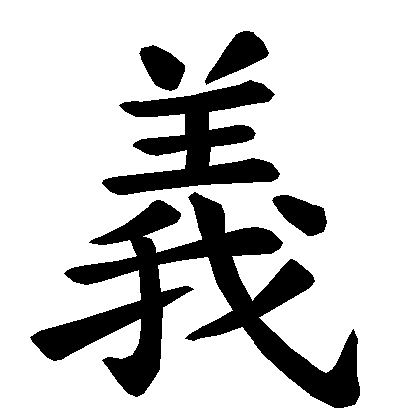 yi: righteousness, morality (Lau); both
misleading translations. Yi can also mean "change" as in the Book of
Change (Yi Jing [I Ching]). There is even another yi that A&H
(TC) indicate by yi*, so let us make yi as "change" into yi**.
yi: righteousness, morality (Lau); both
misleading translations. Yi can also mean "change" as in the Book of
Change (Yi Jing [I Ching]). There is even another yi that A&H
(TC) indicate by yi*, so let us make yi as "change" into yi**.
Yi, according to A&R, is doing what is appropriate with one’s virtue. Yi is putting li into practice your own way. Yi is one’s own unique disposition to act according to li. One makes one’s own meaning and personal identity. Meaning is fusion of external li and internal yi. Yi is acting appropriately in one’s own situation. It may be necessary, for example, to break promises and tell white lies. Or Mencius' famous example of the prohibition of touching your sister-in-law, but your obligation to save her from drowning if only your hand can save her.
Benjamin Schwartz agrees: yi is "situation-oriented"; it is "the capacity to act correctly in all the complex circumstances of . . . human life." Lau concurs: "Whether an act is yi does not depend only on the motive, but also on whether it is fitting in the situation." Chan also agrees: yi is "necessary to make distinctions" (Source Book, 50).
Therefore, if yi is a personal appropriation of li,
then yi comes before li. Lau’s "rightness" is not quite
"right," but "righteousness" is totally misleading. For
Judeo-Christians righteousness means being "right with God" by confirming to
God's will. The Confucian sage is right with Heaven only in the sense of emulating
Heaven's harmony, stability, and predictability.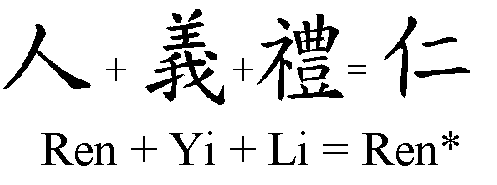
We are now ready to expand our formula for Confucian ethics and to prevent it from collapsing into a mere moralism and thereby validating the sterotype of a rigid, lock-step Confucian ethics. The morally developing person always uses yi to make a personal appropriation of society's norms.
Please note the shematic comparison just below between Aristotle's practical reason (phronesis) and Confucian yi. You can read more details here.
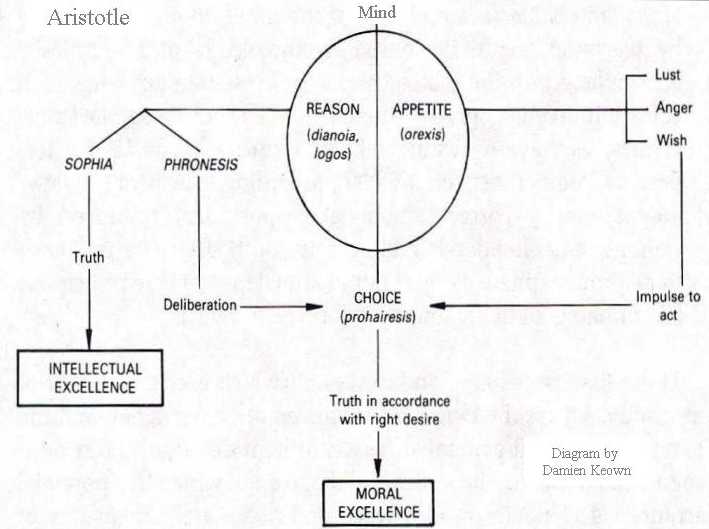
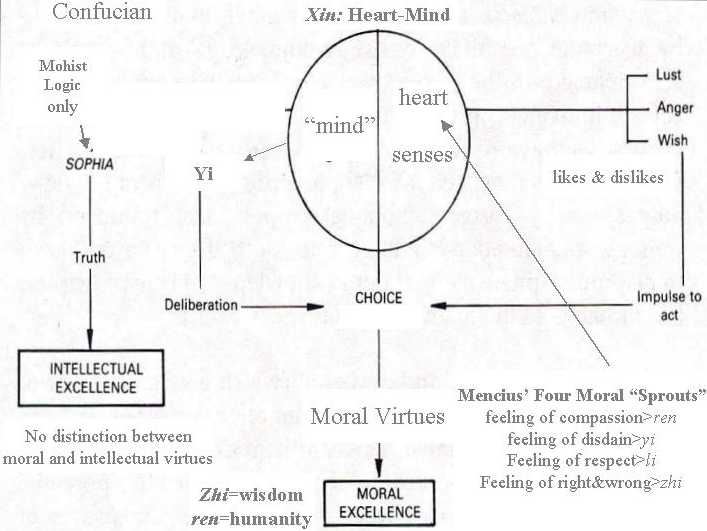
Ren* person using yi “capable of liking or disliking other men” (4.3, Lau) Yi: premoral discrimination of good and bad that matures as truly moral wisdom ( zhi). Terribly wrong when either everyone hates or likes something (15.27). Mencius: yi originates in the “heart of disdain” (2a6, van Norden). Another Confucian classic the Great Learning (#10) speaks of the good effect of constructive criticism and righteous indignation. See Chan's Sourcebook for the translation, specifically p. 93 bottom.
Chinese Conception of Truth: qiu shi--”to pursue what is.” ying shi shi--”to fit the actual situation.”“dynamic correspondence” theory of truth. Pragmatic theory of truth: fitting actions to facts rather than concepts. Yi determines what is appropriate and what fits. “At seventy I could give my heart-mind free rein without overstepping the boundaries” (2.4)
Experiments in Truth in Buddha, Confucius, and Gandhi: Buddhist "expedient means" is teaching to the person, her temperament, her situation, and her level of knowledge. Confucius acts on his “sense of what is appropriate (yi) to extend his Dao” (6.11) Advise to Zilu and Ranyou (11.2). Gandhi’s controversial experiments in brahmacharya (celibacy): sleeping unclothed and untempted with unclothed women.

5:11 The Silver Rule, which is the negative form of the Golden Rule. See also 12:2. John Topel of Seattle University has argued that the logical form of the Golden Rule is more comprehensive in its imperative scope than the Silver Rule. "The positive formulation of the Golden Rule (Do good) encompasses a great deal more actions than does the Silver Rule (Do no harm)."
Is there a way in which you could think of the Silver Rule as superior to the Golden Rule? Think of all the good that perhaps you would like to do to others.
6:11 Praise for his best disciple Yan Hui, who appears more morally advanced than Confucius himself. He also appears, because of his meditative practices, to be more of a Daoist rather than a Confucian.
6:17 (19): Only Chan and Muller translate sheng* as "born" rather than "life." Using "born" or "birth" gives the misimpression that Confucius is describing human natue at birth, so these passages probably do not support a natural goodness innate in all human beings. Contrast Chan “Man is born with uprightness. . . .” with A& R “The life of a person lies in being true” vs. crooked life. Some are born crooked: dried dung cannot be troweled and rotten wood cannot be carved (5:10).
(17:2: humans are only similar (Lau and others: “close”) in their xing (nature) at birth, but then they diverge after that. This passage offers precious little about human nature.)
6:26 Tian (T'ien) Divine Providence, a general heavenly order vs. Di (Ti), an early personal God from the Shang Dynasty. Confucius never refers to Di, but he does sometimes refer to Tian in a very personalized way. See also7:22, 11:8, 14:37.
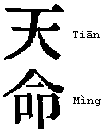 The characters for the tian ming, the mandate
of Heaven, which the bad ruler always loses and the virtuous always keeps.
The characters for the tian ming, the mandate
of Heaven, which the bad ruler always loses and the virtuous always keeps.

The character shen meaning "spirit" or "god." It sometimes means human spirit as an equivalent to the Greek psyche. Kami is the Japanese translation of shen.
8:9 Confucius' feudalism and elitism? Or does it simply mean that the commoners have not yet had the opportunity of a basic education?
Chinese Western Medieval
min vs. servi
ren vs. liberi
The Analects rarely refer to this feudalistic distinction, so the second option above is the preferred one. See 12:5 for universal brotherhood. See 7:7 and 15:38 for teaching all children. Remember that anyone can become a junzi (chun-tzu), lit. “son of the ruler.”
1. Sheng ren sage
god-like—true mediators between Heaven and Earth
Yao, Shun, Yu and King Wen
focus: cosmological
2. junzi "superior" person
focus: sociopolitical
3. The person of ren*: authentic person
focus: interpersonal
Zigong answers: "He's about to become a sage"(jiang-sheng).
Confucius answers: "No, I’m not!" But seems to claim junzi in 9:13.
9:13 Virtue would "rub off" even on the barbarians. Implication here that he is a junzi.
Compare this with Zaiwo's claim in the Mencius: "In my view, the Mater surpassed greatly Yao and Shun [great sage kings]" and Zigong adds that "through the rites of a state he could see its government; through its music, the moral quality of its ruler. Looking back over a hundred generations he was able to appraise all the kings, and no one has ever been able to show him to be wrong in a single instance. Ever since man came into this world, there has never been another like the Master" (2a2, Lau trans.)
It is significant to note that Mencius tells us that Yao and King Wen were originally barbarians (4a1).
11.8 Reaction to Yen Hui’s death: "Heaven is destroying me!"
11:11 Serve humans before shen and think of life not death.
12:1 Ren* is to master oneself and return to li (propriety).
12:2 Ren* is doing the Silver Rule (shu).
12:5 Vision of universal sister-brotherhood. No need for a real brother. Parallels in Jesus: rejecting his mother and siblings: "my disciples are my brothers."
12:11 Rectification of names (zheng ming).
12:17 Logic of punning: zheng is zheng = rectifying is governing. Another pun like ren ren*
12:19 Modeling as the most effective moral exercise. Craft art rather than fine art?
12:22 Being ren* is to love humans. Having zhi (chih) is knowing humans.
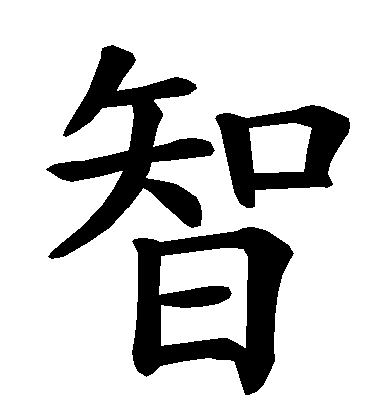 At least three translations of zhi: Chan:
knowledge; Waley: wisdom; Ames and Hall (A & H): realization; predicting—knowing
correctly what to do (H&A, TC, p. 50). Being ren* is realizing oneself,
realizing de, one's virtue or nature.
At least three translations of zhi: Chan:
knowledge; Waley: wisdom; Ames and Hall (A & H): realization; predicting—knowing
correctly what to do (H&A, TC, p. 50). Being ren* is realizing oneself,
realizing de, one's virtue or nature.
Zhi is moral wisdom that is realized in practice. One must make ren* real and concrete. No love of theoretical wisdom (philo + sophia) as in European philosophy. Instead: philo + phronesis (practical reason).No distinction between intellectual and moral virtue. “to know is to authenticate in action” (A&R, 55). See 6.22, 15.32, 8.9, 15.4.
13:3 Rectification of names assumes direct correlation between truth, language, and humans/things. Same idea in classical Western philosophy. Fingarette will express as using correct language to produce effective action. Saying "please" and "thank you" is "performative" language--using language to get things done.
13:18 The son should protect the father. Compare with Plato’s Euthyphro.
14:34 (36) Daoists would repay hatred with kindness (de). (Slingerland) Jesus: we should love our enemies, turn the other cheek, and forgive 70x70. Confucius: “How then shall we repay kindness?” “Repay hatred with uprightness (zhi, justice, impartiality, remaining true [A&R]) and repay kindness with kindness.” Not retribution theory: repay like for like.
![]() De is variously translated
as excellence, virtue, function, but Slingerland's kindness is just right in this
instance. Confucius said that Tian is the source of the de that is in me,
and both Confucianism and Daoism hold that everything that exists has its own de.
It is that which makes a thing what it is. It is equivalent to the Greek arete,
a thing's function and potential excellence.
De is variously translated
as excellence, virtue, function, but Slingerland's kindness is just right in this
instance. Confucius said that Tian is the source of the de that is in me,
and both Confucianism and Daoism hold that everything that exists has its own de.
It is that which makes a thing what it is. It is equivalent to the Greek arete,
a thing's function and potential excellence.
14:37 My understanding penetrates the higher level. Only tian knows me. Confucius' intimate relationship with tian again.
15:4 The effortless ruling of Shun. Just simply magical? Both Confucianism and Daoism believe that spontaneous acting (much like a superb athlete) is the ideal of moral excellence.
15:17 (18): "The junzi has morality (yi) as his basic stuff...." (Lau). This is, as we have already seen, is not the best translation of yi. A&R have a better track on this term. Yi is doing what is appropriate with one’s virtue. Yi is putting li into practice your own way.
15:23 One word for Confucian ethics: Shu, the Silver Rule.
15:39 In education there should be no class distinction. Distinction between min and ren dissolved here (cf. 8:9).
16:9 Those born with knowledge (zhi) vs. those who just learn (xue).
17:2 By nature (xing) humans are alike, but grow apart in practice. Virtue (de) only as potential; not actualized. Compare with 6:17 (Chan); note difference in Lau’s 6:17. No real clue about basic human nature here.
17:19 Zigong’s rebuke of Confucius when he wishes to be silent. Zigong should have persisted. Yes, tian is silent, but the sage is its spokesperson.
17:23 Yi is most important for the junzi. It must come before ren*.
17:25 Sexism and elitism
19:11 Small transgressions are OK? Acting out yi may require suspending some rules.
19:24 Confucius is like the sun and the moon. Similar attribution to the ancient sages. Still not deification.